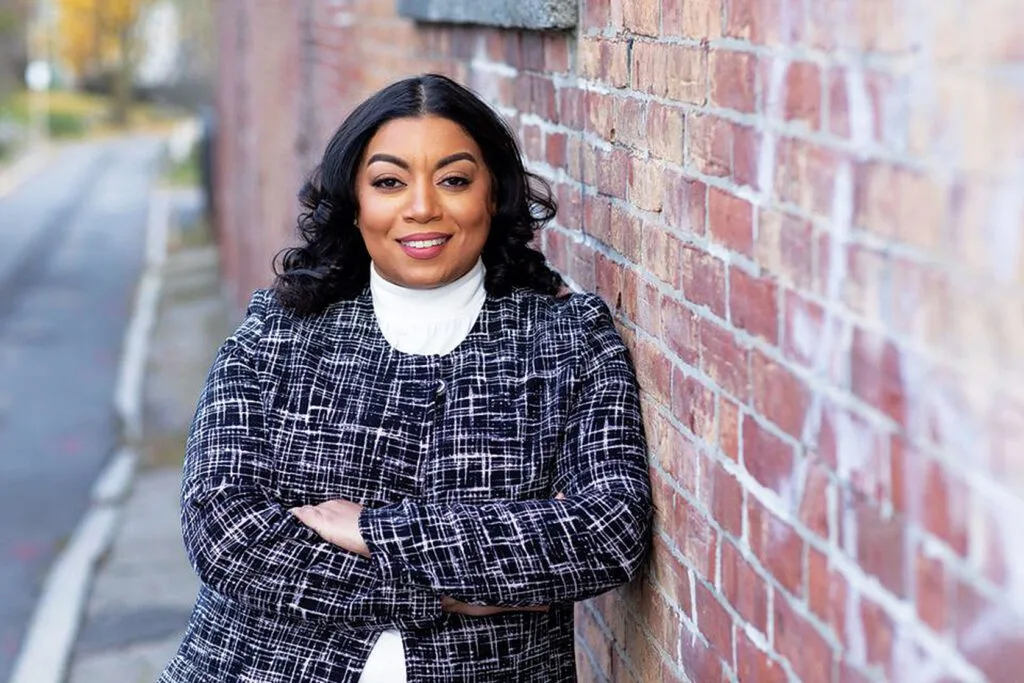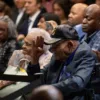
State Senator Liz Miranda PHOTO: FLAVIO DEBARROS
Legislation from state Sen. Liz Miranda would create a task force to consider reparations for the descendants of enslaved people in Massachusetts.
If passed, the bill that Miranda filed in February would create a nine-member commission made up of academics and representatives from organizations involved with civil society, reparations and grassroots organizing.
Massachusetts joins a number of states moving to take up the reparations issue. Connecticut, New Jersey and others have considered legislation to create commissions. In 2020, California established the first statewide reparations task force. Others, including Illinois and New York, have formed task forces this year.
The commission proposed in Massachusetts would focus not only on impacts of slavery, but also other elements of systemic racism that arose following its abolition, including redlining, urban renewal and racial segregation.
Miranda, who represents the 2nd Suffolk district in parts of Roxbury and Dorchester, pointed to the fact that a Black woman wasn’t elected to the Massachusetts legislature until 1973 and only four Black women have served in the state Senate.
“All these things happened post the abolishment of slavery, and there’s a direct link in my opinion — and I think a lot of historically-connected people that believe reparations is past due, based on not only the institution of slavery, which was barbaric in itself, but the ramifications that came post that sort of 100-plus year history of enslavement of Black people and what came after that,” Miranda said.
That comprehensive approach to reparations is important, considering the long history of a Black presence in Boston, some of whom have direct links to slavery and some who do not, said Elizabeth Tiblanc, vice president of programs at Embrace Boston, the racial equity nonprofit behind the memorial to Martin Luther King Jr. and Coretta Scott King unveiled in the Boston Common in January.
“We have to think about Boston as a home to many people across the Black diaspora who have immigrated here over the course of time and who have been subjected to discrimination and oppression at the hand of white supremacy,” Tiblanc said. “That’s really our thinking about reparations, right? It’s really thinking about that trajectory of time.”
Embrace Boston is working to support the legislation through bimonthly convenings to discuss efforts around reparations.
Miranda said her interest in crafting this bill is personal, coming from a longstanding love for African American history as well as family ties to Cape Verde, a country with a long history of connections to the transatlantic slave trade.
She sees the legislation as an opportunity for the state to examine its legacy with slavery — one she said residents are often hesitant to confront.
“I’ve always had this, sort of, question in the back of my mind of why Massachusetts is so averse to talking about its truth and its true connectivity to the history of slavery,” Miranda said.
While Massachusetts was the first state to abolish slavery, it was also the first colony to legalize it in 1641. At the time, according to the Massachusetts Historical Society, Massachusetts was one of the principal slave trading colonies in the New England. It took lawsuits from two enslaved people — Elizabeth Freeman and Quock Walker — for the state to abolish slavery.
“For me, it’s about us needing to right a wrong that Massachusetts actually led on and stop this sort of narrative that Massachusetts was full of the good white people,” Miranda said. “That’s just not true; we were very much a part of supporting the institution of slavery here.”
The bill has been assigned to the Judiciary Committee but hasn’t received a hearing date. In the interim, Miranda is working with outside organizations, including the Massachusetts Black Reparations Collective and the New Democracy Coalition, to make edits to the bill in an effort to strengthen it. Miranda said those edits include considerations around enlarging the commission, providing resources for them and crafting a clearer definition of who falls under the umbrella of “descendants of slavery.”
Rep. Brandy Fluker Oakley, who represents the 12th Suffolk district in Mattapan and Hyde Park, has put forward her own bill that would also create a reparations commission. Miranda said as they wait for a hearing in the Judiciary Committee, she is also working with Fluker Oakley to synthesize a combination of their legislation that they hope will be able to pass in both houses.
Boston is among municipalities across the country that have formed local task forces. Members of the city’s task force were named in February after its creation under an ordinance last year.
At the end of September, the City of Boston Reparations Task Force put out a request for proposals looking for researchers to study the history and legacy of slavery in the city. Six contracts are to be awarded for research narratives on historical periods from 1620 to the present. The deadline for submitting proposals is Nov. 6.


